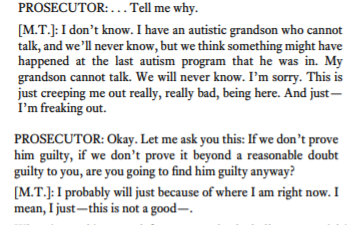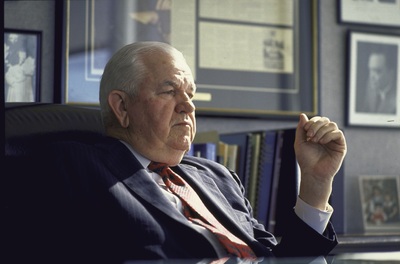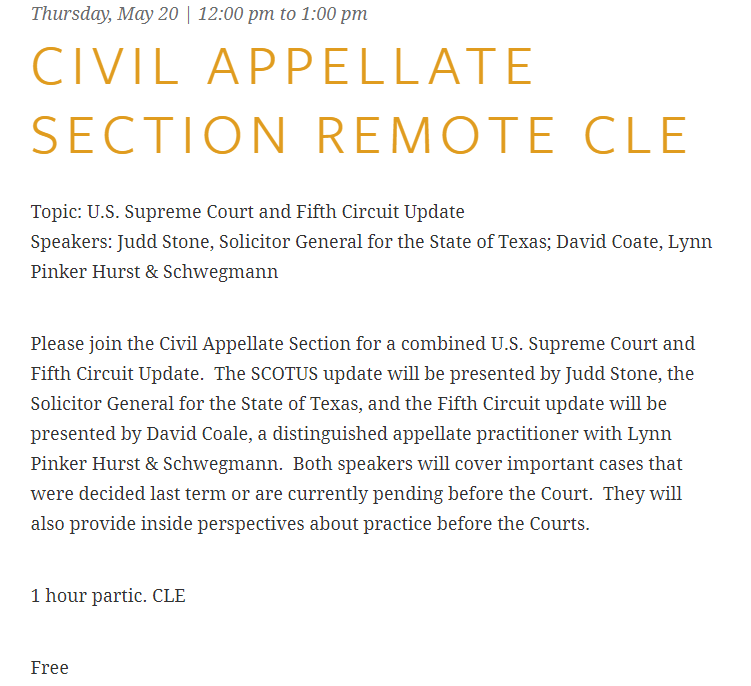 The “similar birds” case — Alliance for Good Government v. Coalition for Better Government — returned to the
The “similar birds” case — Alliance for Good Government v. Coalition for Better Government — returned to the  Fifth Circuit to address attorneys’ fees. The panel majority affirmed the final fee award, over a strong dissent that questioned the application of the Lanham Act to what it saw as purely political speech. No. 20-30233 (May 19, 2021).
Fifth Circuit to address attorneys’ fees. The panel majority affirmed the final fee award, over a strong dissent that questioned the application of the Lanham Act to what it saw as purely political speech. No. 20-30233 (May 19, 2021).
Monthly Archives: May 2021
Canfield v. Lumpkin presented an ineffective-assistance claim arising from voir dire. The record showed the following exchange with the juror in question, followed by general questions to the panel about the ability ot be fair, with no individual followup questioning of this juror:
 The panel majority found no error sufficient to justify habeas relief, as well as a lack of sufficient prejudice. A dissent saw matters otherwise: “[T]he trial judge and counsel were acutely aware of the necessary care that must attend jury selection and the challenges of this case. Our question is whether they succeeded in protecting the jury room. Unlike the majority, I conclude that they did not. During voir dire, a prospective juror volunteered that she felt the defendant was guilty and would probably vote to convict him even if the State failed to prove his guilt beyond a reasonable doubt. Neither counsel nor the judge followed up with her. So, she served on the jury that first convicted Jerry Lee Canfield and, then, free to choose from a menu of sentences from 5 years to life imprisonment, sentenced him to 50 years in prison without the possibility of parole.” No. 18-10431 (May 18, 2021).
The panel majority found no error sufficient to justify habeas relief, as well as a lack of sufficient prejudice. A dissent saw matters otherwise: “[T]he trial judge and counsel were acutely aware of the necessary care that must attend jury selection and the challenges of this case. Our question is whether they succeeded in protecting the jury room. Unlike the majority, I conclude that they did not. During voir dire, a prospective juror volunteered that she felt the defendant was guilty and would probably vote to convict him even if the State failed to prove his guilt beyond a reasonable doubt. Neither counsel nor the judge followed up with her. So, she served on the jury that first convicted Jerry Lee Canfield and, then, free to choose from a menu of sentences from 5 years to life imprisonment, sentenced him to 50 years in prison without the possibility of parole.” No. 18-10431 (May 18, 2021).
Please sign up for my Fifth Circuit update for the Austin Bar Association this Thursday, May 12, at noon – here is the link – and Texas Solicitor General Judd Stone will present a Supreme Court update as well! Here is a draft of my PowerPoint for the presentation.
Removals under the federal-officer statute have drawn increased scrutiny in recent years. In BP P.L.C. v. Mayor and City Council of Baltimore, the Supreme Court addressed an important issue about appellate review of remand orders involving that statute, concluding: “To remove a case, a defendant must comply with 28 U. S. C. §1446. Essentially, that statute requires the defendant to provide affected parties and
courts with a notice stating its grounds for removal. §§1446(a), (d). The combination of these actions ‘effect[s] the removal.’ §1446(d). To remove a case ‘pursuant to’ §1442 or §1443, then, just means that a defendant’s notice of removal must assert the case is removable ‘in accordance with or by reason of’ one of those provisions. Here, everyone admits the defendants’ notice of removal did just that by citing §1442 as one of its grounds for removal. Once that happened and the district court ordered the case remanded to state court, the whole of its order became reviewable on appeal.” No. 19-1189 (U.S. May 17, 2021) (footnotes omitted).
The appellant in Lillie v. Office of Financial Institutions argued that an adverse summary judgment was based on an unreliable case. The Fifth Circuit disagreed: “The court relied on Friedman only in reasoning that a showing of ‘but-for causation’—namely that SEI might have been able to prevent STC’s violations—is not enough to establish control. Such a rationale … is distinct from Friedman’s independent holding that the plaintiffs there had not alleged culpability. One may cite a case without endorsing everything for which it stands. The district court understood the law.” No. 19-30705 (May 14, 2021).
 Roe v. Wade famously named Dallas County DA Henry Wade (right) as its defendant, because he was the official charged with enforcement of the criminal statute at issue. The Texas Legislature has passed a new abortion law — a “heartbeat bill” — that features a novel enforcement procedure involving private litigants. The statute disclaims any
Roe v. Wade famously named Dallas County DA Henry Wade (right) as its defendant, because he was the official charged with enforcement of the criminal statute at issue. The Texas Legislature has passed a new abortion law — a “heartbeat bill” — that features a novel enforcement procedure involving private litigants. The statute disclaims any  public enforcement, relying on a private right of action against abortion providers that features an extremely broad definition of standing. The Texas Tribune correctly notes that the Fifth Circuit’s en banc opinion in Okpalobi v. Foster, 244 F.3d 501 (5th Cir. 2001), declined to extend Ex Parte Young (left) to a Louisiana statute that created a somewhat-analogous private cause of action against abortion providers. Assuming that the Governor signs the new Texas law, Okpalobi will likely be cited frequently in federal-court challenges to it. (I recently did a an interview with Fox 4’s “Good Day” about this new law.)
public enforcement, relying on a private right of action against abortion providers that features an extremely broad definition of standing. The Texas Tribune correctly notes that the Fifth Circuit’s en banc opinion in Okpalobi v. Foster, 244 F.3d 501 (5th Cir. 2001), declined to extend Ex Parte Young (left) to a Louisiana statute that created a somewhat-analogous private cause of action against abortion providers. Assuming that the Governor signs the new Texas law, Okpalobi will likely be cited frequently in federal-court challenges to it. (I recently did a an interview with Fox 4’s “Good Day” about this new law.)
While Olivarez v. T-Mobile involved the high-profile topic of Title VII’s protection for transgendered individuals, it turned on a basic and common proof problem in such cases: “Olivarez has failed to plead any facts indicating less favorable treatment than others ‘similarly situated’ outside of the asserted protected class. In fact, the Second Amended Complaint does not contain any facts about any comparators at all. The complaint simply indicates that Olivarez took six months of leave from September 2017  to February 2018—including an extension granted by T-Mobile and Broadspire—and that when Olivarez requested additional leave in March 2018, T-Mobile denied the request and terminated Olivarez’s employment in April 2018. Notably, there is no allegation that any non-transgender employee with a similar job and supervisor and who engaged in the same conduct as Olivarez received more favorable treatment.” No. 20-20463 (May 12, 2021) (emphasis added).
to February 2018—including an extension granted by T-Mobile and Broadspire—and that when Olivarez requested additional leave in March 2018, T-Mobile denied the request and terminated Olivarez’s employment in April 2018. Notably, there is no allegation that any non-transgender employee with a similar job and supervisor and who engaged in the same conduct as Olivarez received more favorable treatment.” No. 20-20463 (May 12, 2021) (emphasis added).
 In 2017, the USS Fitzgerald, a U.S. Navy destroyer, collided with the MV ACX Crystal, a commercial container ship, in Japanese territorial waters. The incident caused extensive damage and injury, including the death of seven American sailors. Relatives of the deceased sailors sued the ship owner in federal court under the Death on the High Seas Act. They based personal jurisdiction on Fed. R. Civ. P. 4(k)(2), “alleging that, despite NYK Line’s status as a foreign corporation, its substantial, systematic, and continuous contacts with the United States should make NYK Line amenable to suit in federal court.” I
In 2017, the USS Fitzgerald, a U.S. Navy destroyer, collided with the MV ACX Crystal, a commercial container ship, in Japanese territorial waters. The incident caused extensive damage and injury, including the death of seven American sailors. Relatives of the deceased sailors sued the ship owner in federal court under the Death on the High Seas Act. They based personal jurisdiction on Fed. R. Civ. P. 4(k)(2), “alleging that, despite NYK Line’s status as a foreign corporation, its substantial, systematic, and continuous contacts with the United States should make NYK Line amenable to suit in federal court.” I
In Douglass v. Nippon Yusen Kabushiki Kaisha, the Fifth Circuit noted that that the case raised novel but significant issues about the distinction between 5th and 14th Amendment due process protections, but found itself constrained by the “rule of orderliness” to follow an earlier Circuit case on the topic. A 2-judge dissent urged en banc consideration, noting that “[o]ur decision today … determines that a global corporation with extensive contacts with the United States cannot be haled into federal court for federal claims arising out of a maritime collision that killed seven United States Navy sailors.” No. 20-30379 (April 30, 2021).
